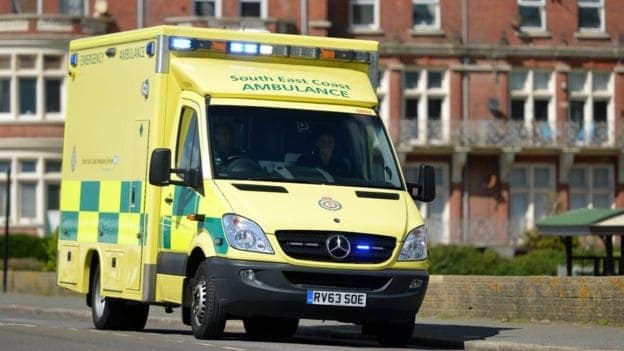
Ambulance staff body-cams ‘to tackle paramedic attacks’
Paramedics could start wearing body cameras in the south east of England as part of efforts to tackle a 46% rise in assaults on them.
South East Coast Ambulance Service (Secamb) trust data showed attacks rose yearly from 98 in 2011-12 to 184 in 2015-16, including a jump from 126 in 2014-15 to 184 last year.
Secamb said several ambulance services were looking at using “body-cams”.
Unison has called for a government-led task force to tackle the problem.
Secamb security manager Adam Graham said current measures included CCTV, risk assessments and conflict resolution training.
He added: “One thing that’s being looked at nationally is additional devices and additional training – so for the devices, body-cams, such as the police have, [are] being considered.”
The ambulance service, which released its figures under a Freedom of Information Act request, can also take sanctions ranging from warnings to prosecutions over violence and aggression, he said.
In 2015-16, Secamb submitted 44 sanctions.
Paramedic Gemma Fitzgerald was assaulted while trying to help a lady who was collapsed in the street.
“When we got there, she was lying in the road and we knew that she was quite agitated, screaming and shouting at passers-by,” said Ms Fitzgerald.
“She became really verbally abusive, so we backed off and made sure the road was safe with the ambulance and called police.
“But whilst we were waiting for them, she actually started to attack a friend. She also started to hurt herself.
“As we stepped in, she sort of caught my eye, and that was it. I became the target of her aggression.
“[She was] very verbally abusive, lashing out, and actually managed to – I was kneeling down next to her – kick up and kick me in the face, knocking me off my feet.
“The police arrived and pretty much arrested her straight away. I went to hospital and found I had a broken jaw.”
When several services met last year for a presentation by Kent Police on body-cams, one of the features was the quality of evidence, Mr Graham added.
West Midlands Ambulance Service is also looking at body-cams – a spokesman said the trust was looking at costs but “nowhere near piloting it”.
But Bea Adi, from Unison, said: “It’s not just about things like CCTV, it’s about educating people to let them know the impact that these incidents have on people who are working to protect them.
“Unison itself is calling for the government to set up a special task force that looks at ways of keeping people safer in their roles.”
NHS Protect said it undertook research into assaults in the ambulance sector, including aggravating factors such as likelihood of injury, times incidents were most prevalent and the demographics of the perpetrator.
It said it was working to provide guidance for the future and the protection of NHS staff.
In a sample of 2,479 incidents between 2010 to 2015, NHS Protect found 1,184 had one or more aggravating factors and of those 22.1% were attributed to illegal drugs and 72.2% to alcohol.